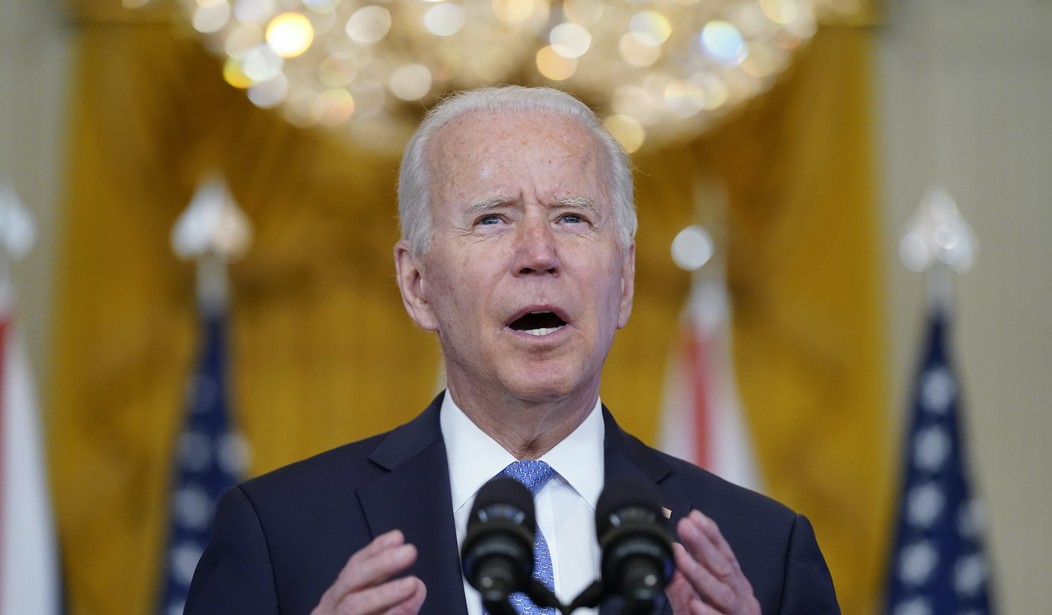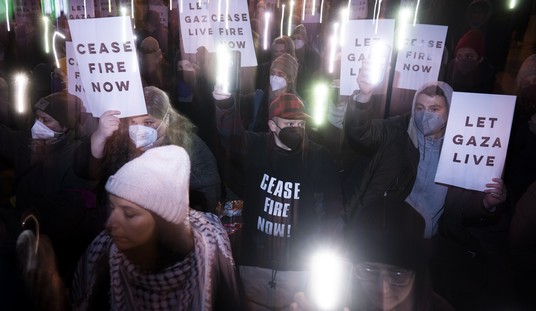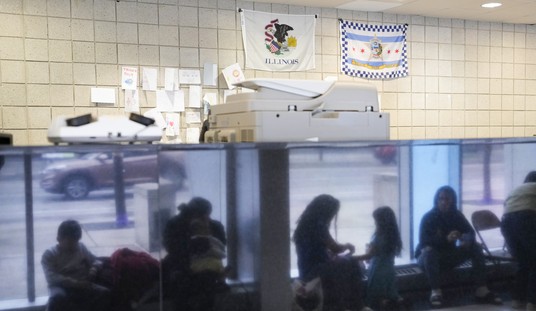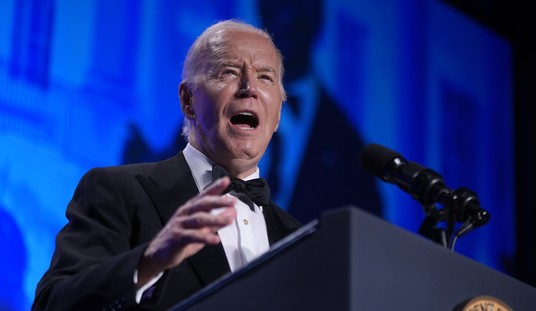Well, what’s Joe Biden going to say — “I did that“? Biden has tried several strategies for messaging on inflation, including outright denial, discounting it as evidence of actual growth, the “transitory” explanation, and finally settling on “corporate greed.”
That’s the “bizarre message” to which the Washington Post editorial board objected last night:
President Biden is facing mounting criticism for inflation’s rise to its highest level since 1982. Unfortunately, the White House’s latest response is to blame greedy businesses.
Economists across the political spectrum are rightly calling out the White House for this foolishness. Even some within the White House are questioning this approach, The Post reports.
Inflation, which was relatively low for years, did not suddenly rise in recent months because businesses decided now was the ideal time to squeeze their customers. What actually happened is that demand soared for many products as the economy recovered.
That’s, um, not what actually caused this massive expansion in inflation. It may be contributing to it, but the true cause of this inflationary wave isn’t even just the massive and unnecessary stimulus pushed by Biden at the beginning of his term. A couple of weeks ago, Politico offered an insightful profile of former Federal Reserve board member Thomas Hoenig, who was the lone holdout against the Fed’s quantitative easing policies that began in the Barack Obama administration. He warned at the time that the Fed’s monetary expansion would not just create an inflationary wave, but leave them no recourse except to create a crippling recession to fix the problem at some point:
Between 2008 and 2014, the Federal Reserve printed more than $3.5 trillion in new bills. To put that in perspective, it’s roughly triple the amount of money that the Fed created in its first 95 years of existence. Three centuries’ worth of growth in the money supply was crammed into a few short years. The money poured through the veins of the financial system and stoked demand for assets like stocks, corporate debt and commercial real estate bonds, driving up prices across markets. Hoenig was the one Fed leader who voted consistently against this course of action, starting in 2010. In doing so, he pitted himself against the Fed’s powerful chair at the time, Ben Bernanke, who was widely regarded as a hero for the ambitious rescue plans he designed and oversaw.
Hoenig lost his fight. Throughout 2010, the FOMC votes were routinely 11 against one, with Hoenig being the one. He retired from the Fed in late 2011, and after that, a reputation hardened around Hoenig as the man who got it wrong. He is remembered as something like a cranky Old Testament prophet who warned incessantly, and incorrectly, about one thing: the threat of coming inflation.
But this version of history isn’t true. While Hoenig was concerned about inflation, that isn’t what solely what drove him to lodge his string of dissents. The historical record shows that Hoenig was worried primarily that the Fed was taking a risky path that would deepen income inequality, stoke dangerous asset bubbles and enrich the biggest banks over everyone else. He also warned that it would suck the Fed into a money-printing quagmire that the central bank would not be able to escape without destabilizing the entire financial system.
On all of these points, Hoenig was correct. And on all of these points, he was ignored. We are now living in a world that Hoenig warned about.
The Fed is now in a vise. Inflation is rising faster than the Fed believed it would even a few months ago, with higher prices for gas, goods and automobiles being fueled by the Fed’s unprecedented money printing programs. This comes after years of the Fed steadily pumping up the price of assets like stocks and bonds through its zero-percent interest rates and quantitative easing during and after Hoenig’s time on the FOMC. To respond to rising inflation, the Fed has signaled that it will start hiking interest rates next year. But if that happens, there is every reason to expect that it will cause stock and bond markets to fall, perhaps precipitously, or even cause a recession.
Indeed. And that should have been obvious from the start when it came to printing more money to deal with the pandemic. Congress had little choice but to adopt the Pottery Barn rule after the federal government drove shutdowns that cost over 20 million jobs and repair the damage Washington did out of necessity. The subsequent stimulus after the CARES Act likely was not just unnecessary but did more economic damage than it sought to repair, especially Biden’s attempt to buy political favor through the third $1.9 trillion bill in March 2021. That monetary expansion accelerated the dynamics about which Hoenig had been warning for over a decade, to no avail in either Republican or Democratic administrations.
That doesn’t let Biden off the hook, clearly. For one, Biden was part of the administration that initially pushed for and cheerled the Bernanke monetary policies. Biden’s third tranche of pandemic stimulus appears to have been the catalyst that kicked off the inflationary wave this year, too. And his bungling of the supply chain crisis as well as a complete lack of focus on actual economic concerns rather than his progressive hobby-horse bill contributed to inflation’s amplitude as well.
Rather than acknowledge all of that, Biden’s gone the full Elizabeth Warren instead, even while his own advisers can’t all figure out what he’s talking about, as the Post reported yesterday:
But the move to blame big firms for the price spikes has divided many supporters of the administration. Senior officials at the Treasury Department, for instance, have been unsettled by the White House’s attempts to blame some large corporations for inflation, skeptical of that explanation for the recent rise in prices, according to four people with knowledge of internal administration dynamics.
Senior Treasury officials are generally supportive of the White House’s broader antitrust strategy and believe it is possible that corporate consolidation is playing some role in higher prices. But they are wary that recent White House efforts risk going too far.
“There are some people at Treasury, all the way to the top, that have a very strong analytical bent and recognize there is something to the notion that the lack of contestability in certain markets has driven up prices, but also think that it’s hard to imagine that’s a significant factor in the current surge,” said Eswar Prasad, an economist at Cornell University and former senior official at the International Monetary Fund. “There is unease at Treasury about pushing this line too hard,” he added. “There is a real concern there about this going too far.”
That line got crossed a couple of months ago, even at the Post. Columnist Catherine Rampell blasted Warren and the White House for the idiotic claim that corporate greed just happened to emerge at the same time that the Biden administration was fumbling the supply chain crisis:
The left’s rhetorical response to the rising political threat of inflation continues to evolve. First they said the problem didn’t exist, and anyone who claimed otherwise was acting in bad faith or spouting Republican propaganda. Then, they said inflation is real — but President Biden’s Build Back Better plan would fix it.
Now, they tell us, inflation might be happening — but it’s the fault of greedy corporations! And those companies must be punished. …
It’s unclear whether this is a cynical comms strategy (as circulation of a recent messaging poll suggests), or if they actually believe this. Either way, it’s nonsense.
For “corporate greed” to be the culprit behind the recent spike in prices, well, you’d have to believe either that businesses suddenly got much greedier — that this is the greediest Thanksgiving ever! — or that businesses somehow suddenly got much more effective at acting upon that greed.
Clearly, Biden didn’t read this criticism over the Thanksgiving holiday. Will he pay attention to its echo from the Post’s editorial board? Given the lack of other options for blamethrowing over his utter incompetence, the safe bet is on no.
Update: Needless to say, this doubling down on anti-trust legislation won’t impact the real drivers of inflation, nor was it originally designed with that in mind. It’s more about Big Tech than corporate-greed-fueled inflation, but it will let Biden pretend to be doing something about the latter:
SENATE GETS SERIOUS ON ANTITRUST: Supporters and critics of one of the Senate’s biggest tech antitrust bills can start the countdown clock for the Judiciary Committee’s markup, which a committee aide tells POLITICO could occur as early as Jan. 27. The bill is listed on the committee’s business meeting agenda for this Thursday, alongside a long slate of judicial and other nominees, but is not expected to come up then, the aide said.
The measure, introduced last October by Sens. Amy Klobuchar (D-Minn.) and Chuck Grassley (R-Iowa), would prohibit big tech companies from unfairly using their own online marketplaces to overwhelm their rivals. It comes after years of accusations from smaller companies about Amazon’s abusive treatment of its vendors and Apple’s dominance of its App Store. The bill’s primetime placement this week means it could move quickly through the committee, as your host reports for Pros.
— S. 2992 has the backing of 10 additional lawmakers from both sides of the aisle, including Chair Dick Durbin (D-Ill.) as well as Sen. Lindsey Graham (R-S.C.). A similar measure, H.R. 3816 from Reps. David Cicilline (D-R.I.) and Ken Buck (R-Colo.) advanced out of the House Judiciary Committee last June.
I’ve advocated for several years for more robust anti-trust enforcement. Had we taken that path ten years ago with Big Tech, we’d have at least a significant amount more distributed power in that industry. This bill looks at least somewhat like closing a barn door after the horse has bolted and too narrow to really impact the free-speech concerns over that concentrated power over public debate.
Also worth pointing out: this would enable Biden’s progressive FTC chair Lina Khan to exert a lot of regulatory power in this industry. That’s something to consider as well. Do Republicans want to proceed on this considering the minimal cover it might provide Biden on inflation (in the short run, anyway) and the long-term boost in power for his progressive regulators?









Join the conversation as a VIP Member